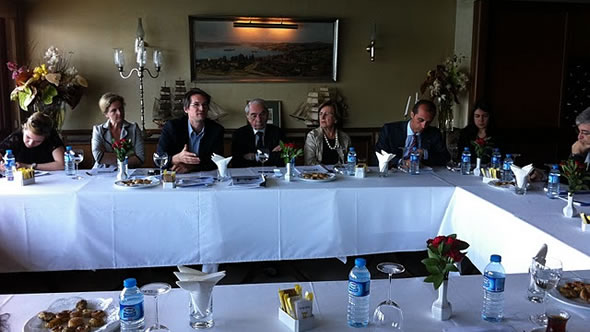Istanbul – ESI launches visa group in Turkey with Giuliano Amato

On 23 May 2011, ESI organized two meetings in Istanbul bringing together Turkish stakeholders interested in working towards a visa liberalisation process for Turkey and Giuliano Amato, Chairman of ESI's Advisory Board for the Schengen White List Project and former Italian Prime Minister and Interior Minister.
Chairman Amato and ESI staff met with representatives of Turkey's EU Secretariat General (EUSG), acting Chairman Haluk Ilicak and Professor Sanem Baykal. They introduced ESI's Schengen White List Project and the plans to incorporate Turkey into this work to the EUSG. The meeting also provided an opportunity for Chairman Amato and ESI to hear the perspectives of official Turkey to the challenges and opportunities ahead.
The other meeting was between Chairman Amato and ESI and Turkey's civil society: NGOs, business associations, academia and media representatives. After an introduction by ESI Chairman Gerald Knaus, Chairman Amato gave a presentation entitled "Getting to the White List - The recent Balkan experience and Turkey." One of the goals of the meeting was to relate the climate and dynamics in the EU with regard to visa liberalization to participating NGOs. Taking these realities into consideration, Turkish stakeholders were encouraged to work together in developing coherent and consistent arguments for their European counterparts why a visa liberalisation process for Turkey would not only be in the interest of Turkey, but also that of the EU. In making the argument that it would make the EU safer, Chairman Amato and Mr Knaus drew upon experiences from the Balkans. They also underlined the positive effect it would have on stemming illegal migration to the EU and stressed that it is EU member states' interior ministers who need to be convinced that a visa liberalisation process will make the borders of the EU more secure, not less.
Another aim of the meeting was to learn about the work the participating academics and NGOs had carried out to date on this and related topics, and to hear their personal accounts about challenges faced in obtaining Schengen visas for Turkish businesspeople, NGO activists, and students.
ESI intends to organise further meetings on the visa issue with the same group.
The Robert Bosch Stiftung has supported this event financially.

- Today's Zaman, Yonca Poyraz Doğan, "Italian minister Amato defends visa free travel to Europe for Turkish citizens" (23 May 2011)
- Short report (in Turkish) by IKV about the meeting
